
It was another glorious moment for UTAR Faculty of Engineering and Green Technology (FEGT) when it bagged yet another two gold and three bronze medals to its growing list of accolades at the National Innovation and Invention Competition through Exhibition 2021 (iCompEx’2021).
The competition was organised by Politeknik Sultan Abdul Halim Mu’adzam Shah on 19 September 2021 via online. The competition saw five teams participating from UTAR. This is the sixth participation by students and academics of FEGT in this competition. The iCompEx’2021 is an annual competition-cum-exhibition of innovation for new discoveries. It served as a platform for participants to highlight their research findings to the public.
The winning teams from FEGT were comprised of Bachelor of Engineering (Honours) Petrochemical Engineering student Tham Kai Onn, Master of Engineering Science student Jin Han, and Doctor of Philosophy (Engineering) student Chin Ying Hui in a team; Master of Engineering Science student Leow Guo Yao, Bachelor of Engineering (Honours) Environmental Engineering student Ng Yee Jie and Master of Engineering Technology student Choong Man Kit in a team; Bachelor of Engineering (Honours) Petrochemical Engineering student Wong Weng Hong, Bachelor of Engineering (Honours) Petrochemical Engineering student Low Kai Ping and Master of Engineering student Yee Min in a team; Bachelor of Engineering (Honours) Environmental Engineering student Lim Yong Chin; and Bachelor of Engineering (Honours) Environmental Engineering student Toh Chun Kit.
The winning teams participated in two categories, namely category “Agriculture, Environment and Renewable Energy” and “Machine, Equipment and Manufacturing Process”.
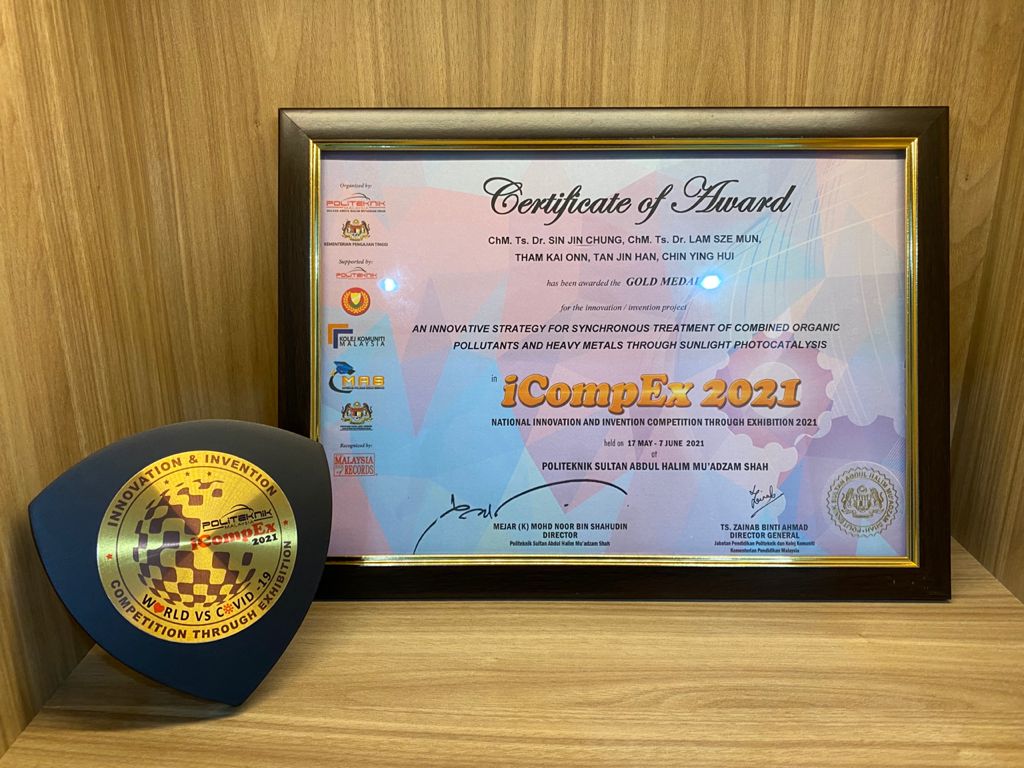
Certificate of award of Dr Sin and his team
Supervised by FEGT Assoc Prof ChM Ts Dr Sin Jin Chung, Tham, Jin Han and Chin won a gold medal and a certificate each for their project titled “An innovative strategy for the synchronous treatment of combined organic pollutants and heavy metals through sunlight photo-catalysis”. The project aimed to develop an innovative strategy for the synchronous treatment of combined organic pollutants and heavy metals through sunlight photocatalysis.
Dr Sin explained, “Over the past few decades, rapid industrialisation had proven to be both boon and bane for human beings. The increasing awareness for environmental protection has paced up because of the alarming situation that mankind is encountering over time. Water pollution caused by organic compounds and heavy metals has seriously affected aquatic biota and ecological balance. In this study, new and efficient sunlight responsive Z-scheme BiOCl/MnFe2O4 nanocomposites were successfully synthesised by a surfactant-free chemical solution method.”
Dr Sin elaborated, “This project was financially supported by Fundamental Research Grant Scheme from the Ministry of Education, Malaysia. I would also like to thank UTAR and Guilin University of Technology, China for sponsoring this project under the UTAR Research Fund and Research Fund of The Guangxi Key Laboratory of Theory and Technology for Environmental Pollution Control respectively. I am glad that our project had won a gold medal in iCompEx’ 2021. I would like to express my deepest gratitude to UTAR for providing financial support for these students. Through this competition, the students will be encouraged to take part in the research and innovation field as this opportunity could help them recognise their abilities and the need to engage in lifelong learning for the betterment of paving their career pathway. The students also gained a good opportunity to learn working as a team and to share their work with experienced individuals. I congratulate them for their outstanding performance in this competition.”
The team’s representative Tham enthused, “We feel honoured and delighted to receive the gold medal award. We are incredibly grateful for the detailed guidance provided by our supervisor, Dr Sin in this prestigious competition. Working as a team is beneficial in tackling a problem productively, particularly during analysing and interpreting the research output. Besides, we can always update ourselves via exchange of ideas during group discussion regarding the technical know-how on the recent innovation and invention in the field of photocatalysis.”
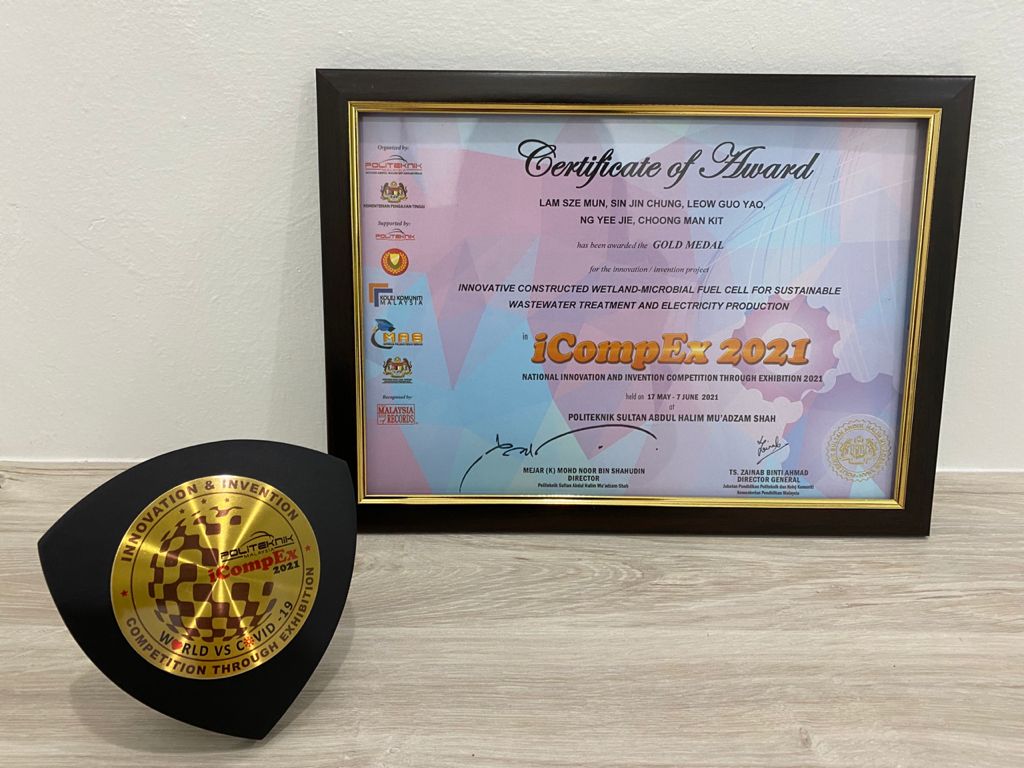
Certificate of award of Dr Lam and her team
Adding to this, another gold medal was secured by the team supervised by FEGT Assoc Prof ChM Ts Dr Lam Sze Mun. The team members, namely Leow, Ng and Choong won a gold medal and a certificate each for their project titled “Innovative constructed wetland-microbial fuel cell for sustainable waste-water treatment and electricity production”. When asked to describe the uniqueness of their project, Dr Lam enthused, “The seriousness of energy crisis and water pollution issue has garnered tremendous public awareness and required to be solved instantaneously. Particularly, the massive use of irreplaceable fossil fuel, as well as inadequate wastewater treatment, discharged recalcitrant pollutants into the natural ecosystem. It is noteworthy that these organic wastes in the wastewater are comprised of rich chemical energy, which is discharged heat as a by-product upon the removal process and is difficult to be recycled through conventional methods. Thus, the idea was to develop alternative techniques that not only undergo waste reduction but also provide concomitantly positive energy and environmental impacts through conversion, recycling and waste reclamation approaches. In this innovative project, we have developed an integrated constructed wetland-microbial fuel cell (CW-MFC), a promising wastewater treatment method for producing bioenergy while degrading contaminants. The constructed wetland (CW) is a human-made wetland that is used as a biological technique to remove contaminants through natural anaerobic and aerobic processes, while microbial fuel cell (MFC) is a bio-electrochemical method that converted organic matters into electricity.”
Dr Lam added, “The students participated in the exhibition by applying the theoretical knowledge learnt in the classroom into the actual wastewater treatment application. They came up with a simple and effective CW-MFC system that promoted the wastewater treatment efficiency as well as bioenergy recovery that was viable to the real-world scenario. The laboratory and presentation skills that they learnt helped a lot in completing their research and competition.”
Representing the team, Leow said, “We participated in this competition to promote a more cost-effective and environmentally-friendly technology in wastewater treatment. We were confident with the research as it was aligned with the global wastewater treatment trend, which aims to achieve energy self-sufficiency rather than energy consumption. Through the competition, we had learned a lot about wastewater treatment, from working principles to future perspectives. The competition has improved our critical thinking skills and built our research interest. It has motivated us to have an intensive study for our future research, especially in green technology. We are greatly honoured to receive the award, and we would like to express our sincere appreciation to our supervisor, Dr Lam.”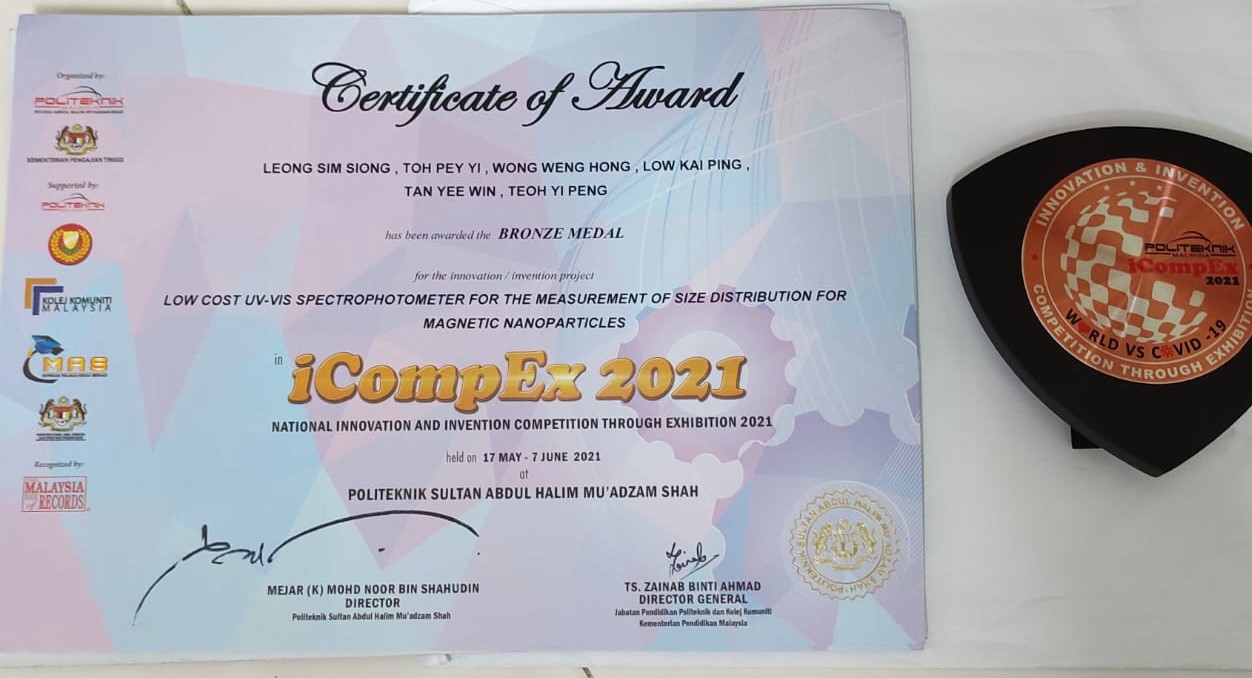
Certificate of award of Dr Sim Siong and his team
Further adding medals to the Faculty was the team supervised by FEGT lecturer Dr Leong Sim Siong. The third team, comprising of Wong, Low and Yee Min, won a bronze medal and a certificate each for their project titled “Low-cost UV-vis spectrophotometer for the measurement of size distribution for magnetic nanoparticles”. The project aimed to establish a low-cost method to capture the size distribution of magnetic nanoparticles. Dr Sim Siong explained, “In this project, a portable UV-vis spectrophotometer was built up by using low-cost components (with a budget less than RM100) to measure the sedimentation kinetics of magnetic nanoparticle solution. With the sedimentation kinetics, the size distribution of the magnetic nanoparticles is deduced by using mathematical calculations. The calculated results were compared with results measured by using dynamic light scattering (DLS). According to the comparison, it can be revealed that the average particle size deduced from the gravitational sedimentation kinetics is relatively close to the DLS measurement, with an average error of only five per cent. Therefore, the outcome of this project has enabled the preliminary measurement of the average size of magnetic nanoparticle system by using only low-cost and portable testing device.”
He added, “I am glad that our project won a bronze medal in iCompEx’21. I would like to express my utmost gratitude to UTAR for supporting the students to join the competition. I also wish to thank the students for their dedication, effort and hard work in the project. Even though their schedule was packed with the other subjects and activities, they were still able to allocate their time to work on the project for the competition. The involvement of students in this competition has strengthened their interest and creativity in research when they were brainstorming to come out with a solution to the problem statement. In addition, the students gained more exposure in the academic research, and this will definitely help them to recognize their abilities better in their future career.”
His student, Wong added, “The main objective for me to join the competition was to gain more exposure related to the innovative invention and problem-solving. The competition also can help to showcase our invention/project (low-cost and portable device to acquire the size distribution of magnetic nanoparticles) to the public.”
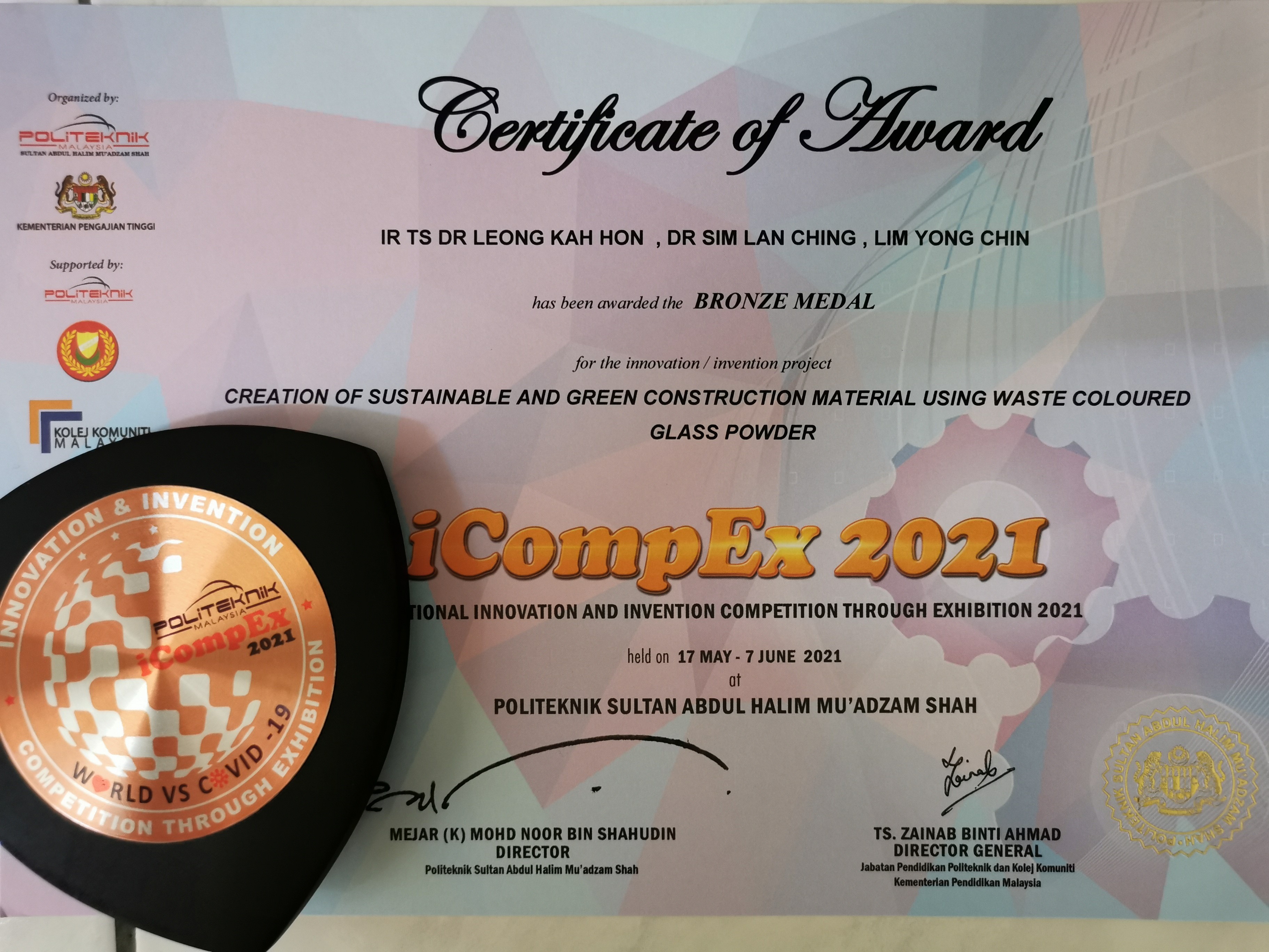
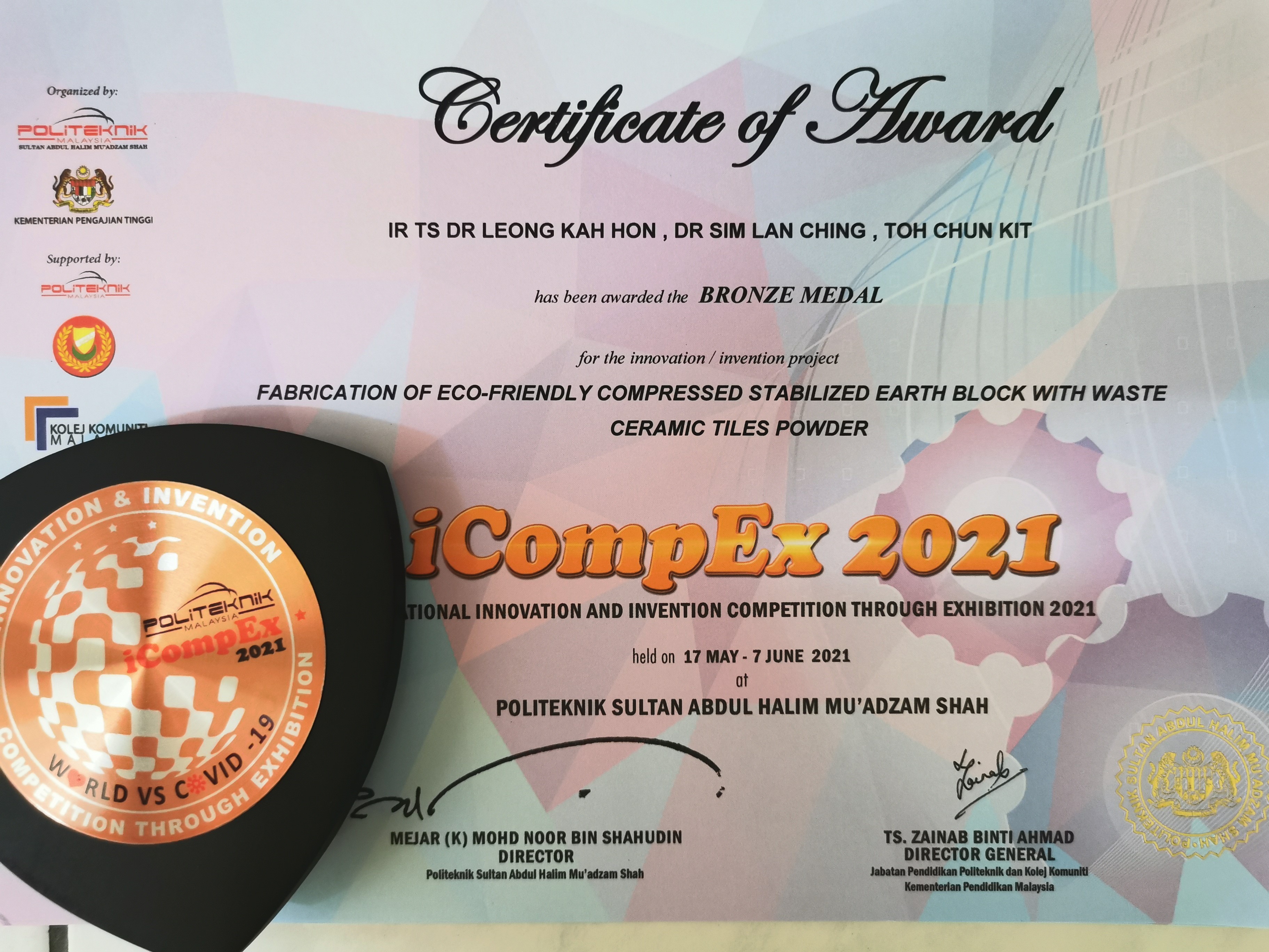
Certificates of award of Dr Kah Hon and his students
Last but not the least, the last two bronze winners Lim and Toh were supervised by FEGT lecturer Ir Ts Dr Leong Kah Hon for their projects titled “Creation of sustainable and green construction material using waste coloured glass powder” and “Fabrication of eco-friendly compressed stabilised earth block with waste ceramic tiles” respectively. Both projects aimed to turn industrial waste into eco-construction material that will benefit the construction industry. Lim’s project focused on using waste ceramic tiles, mainly generated from the construction industry in fabricating compressed stabilised earth brick (CSEB). Meanwhile, Toh’s project focused on recycled glass in fabricating CSEB.
When Lim was asked, what made him participate in the competition, he said, “My objective was to challenge myself to develop new innovations that could benefit society. I learned a lot of useful skills by participating in this competition. It helped to improve my problem-solving and presentation skills.”
On the other hand, Toh added, “By joining this competition, it indeed added value to my resume and it allowed me to create useful materials from wastes. It encouraged me to think out of the box and boosted my confidence too.”
As the supervisor, Dr Kah Hon explained, “As we know, glass cannot be recycled, therefore, it ends up as a waste that will be disposed of in landfills. Interestingly, by using both of these waste materials, we are not just addressing the waste disposal issue; in addition, we managed to reduce the usage of cement in the conventional CSEB fabrication. Therefore, both of these innovations have successfully addressed two issues: waste disposal and the high usage of cement that will increase CO2 in the atmosphere.”
He continued, “I am very proud of both my students for winning this competition with their brilliant innovations in turning waste material into something valuable and beneficial to society and at the same time addressing the current environmental issue such as global warming due to the increase of CO2. The disposal of waste material has become an alarming issue in the industry in the current context due to the shortage of landfills. These winning innovations provided an alternative solution in managing waste disposal. Both innovations have enhanced the students’ creativity in creating and providing a solution to the current issue. Furthermore, this competition provided the students with a good platform to think critically and provide a practical solution that the industry can easily adopt. This is in line with the government’s initiative of promoting work-based learning at universities.”
The iCompEx’2021 is a competition designed specially to provide a platform for young researchers to present their innovations. The iCompEx’2021 was the ninth in the series since it was first launched in 2013.
© 2021 UNIVERSITI TUNKU ABDUL RAHMAN DU012(A).
Wholly owned by UTAR Education Foundation (200201010564(578227-M)) LEGAL STATEMENT TERM OF USAGE PRIVACY NOTICE